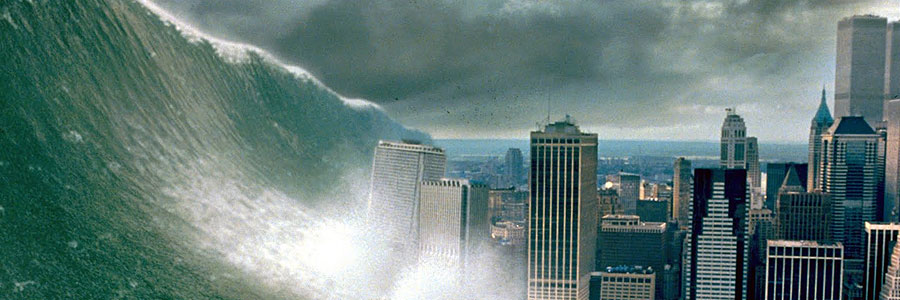
Deep Impact
Paramount Pictures
Original release: May 8th, 1998
Running time: 121 minutes
Director: Mimi Leder
Writers: Bruce Joel Rubin, Michael Tolkin
Cast: Tea Leoni, Morgan Freeman, Elijah Wood, Robert Duvall, Maximilian Schell
Impact. 01:26:40 to 01:28:43
Deconstructing Cinema: One Scene At A Time, the complete series so far
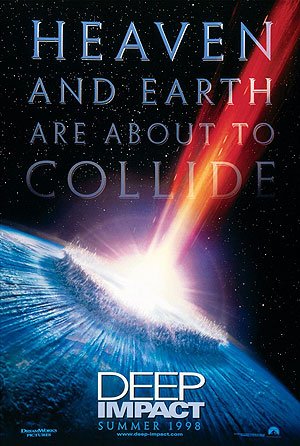
Waking up on the morning of 15th February 2013 was a strange experience. I remember taking a quick look at the news before getting my first coffee of the day, but soon a series of images streaming online had the same effect on me as a good portion of caffeine. With my eyes wide open, I watched various dash cam footages from Chelyabinsk in Russia showing what looked like an end-of-the-world sequence in a Hollywood movie. A meteor turning brighter than the sun as it entered our atmosphere was a spectacle that still sends a chill down my spine. People like me with an interest in cosmic events were all confused that morning as we’d all known that a sizeable object was on its way to our planet, but it was predicted to be a close approach, not an impact.
We didn’t have to wait long for an explanation though; astrophysicist Neil DeGrasse Tyson was soon giving various TV interviews telling the public that there were not one but ‘two’ asteroids heading for us that day. A “cosmic coincidence” as he called the predicament. Although the meteor in Russia exploded before impact, it still injured around 1,500 people on the ground with its massive release of energy that was 30 times more than the atom bomb that exploded over Hiroshima. Incredibly, this was only the small one that day with another one called 2012 DA14 that came by 16 hours later on a record close approach between Earth and our orbiting satellites.
I’ve long been a fan of Neil DeGrasse Tyson – even before the Chelyabinsk meteor – so I eagerly watched everything I could find with him talking about the Russian meteor and the following near-miss. As well as being one of the world’s most prominent science communicators, Dr. Tyson can also be a lot of fun when he talks about scientific gaffes in movies. He’s scolded James Cameron for an inaccurate night sky in Titanic (1997) – which was later corrected in the film’s re-release – and Ridley Scott for getting the distance wrong between Earth and the alien planet in Prometheus (2012). Naturally, I wanted to know what his favourite space-oriented movie was and I later found out from a discussion he did with Authors@Google. He cited two films there, one is not surprisingly Robert Zemeckis’ Contact (1997) based on Carl Sagan’s novel of the same name and I’ll let him talk about the second one:
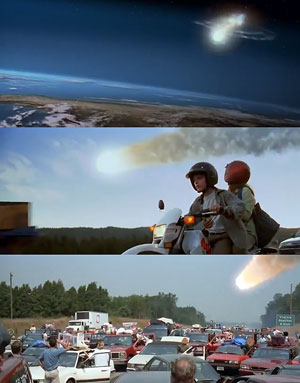
Interestingly, I didn’t see Deep Impact when it came out in 1998 precisely because I’d seen Armageddon much to my dismay. The two disaster films came out around the same time and I assumed they were versions of each other and that Deep Impact would be held to the same sensationalist standards as its counterpart. So I stayed away from it until Neil DeGrasse Tyson gave his assurance that this was a no-nonsense kind of apocalypse. Of course, watching this film after the Chelyabinsk meteor event in Russia for the first time had its own unique perspective to offer.
The same way we knew about the above mentioned 2012 DA14 as well as the notorious 99942 Apophis which will come similarly close to Earth on April 13th 2029, the asteroid in Deep Impact is also discovered well ahead of collision. Teenage Leo Biederman (Elijah Wood) first notices an object while observing the night sky with his astronomy club. The fact of a massive asteroid on collision course with Earth isn’t brought to light due to a car accident involving the astronomer who first calculates its trajectory, so it’s up to MSNBC reporter Jenny Lerner (Tea Leoni) to uncover the secret already known by the government one year later. The film’s plot has an engaging lead-in as Jenny investigates the resignation of the Secretary of the Treasury (James Cromwell) and his apparent mistress “Ellie”. Soon after a number of disapproving ‘men in black’ show up, she finds out that Ellie is not Ellie, but instead E.L.E which is the short for “Extinction Level Event”.
Jenny eventually gets the US President (Morgan Freeman) to make a public statement and tell the world that the Americans have been collaborating with the Russians to intercept the comet by landing on it and planting a nuclear bomb 100 meters beneath its surface. Having watched this plan go terribly wrong in Deep Impact, it seems worth noting that this is no longer the deflection scenario scientists have in mind to deal with an identical crisis. Nuclear weapons have been scratched from the agenda and we now have a far more reasonable plan to gently nudge the asteroid out of harm’s way using the gravitational field between itself and a spacecraft parked next to it. This new plan would change the end of the film quite a bit.
I think we are now growing out of the disaster movie era that seemed to have come about mostly to show off CGI destruction on a mass scale, but Deep Impact is one of the more thoughtful films that is engaging and has stood the test of time. The characters are so well-written that I thought the events on Earth to be more interesting than the astronauts’ save-the-world mission in outer space. Tea Leoni’s performance is brilliant, especially in the scene where she gets drunk after finding out Earth’s possible fate and thinks it’s hilarious when her estranged father’s new wife tells her that “life goes on”.
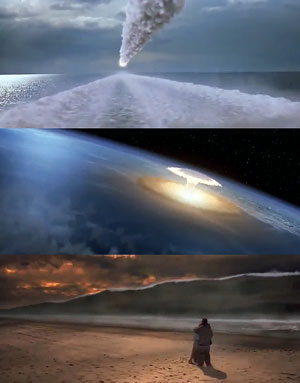
I could finish by saying something hip like “Morgan Freeman is even better than Barack Obama”, but I’d rather go back to Neil DeGrasse Tyson because he has repeatedly said something that shows we still don’t take the issue of Earth-bound asteroids seriously despite statistical evidence that sooner or later this will be very real danger. Watching Deep Impact with his words in mind was a far more chilling experience as I think the point of the film is that this ‘could happen’. Dr Tyson said this on PBS News Hour after Chelyabinsk meteor event and the following near-miss by 2012 DA14:
SOURCES:
[1] Authors@Google – Neil deGrasse Tyson
[2] PBS News Hour, Neil deGrasse Tyson
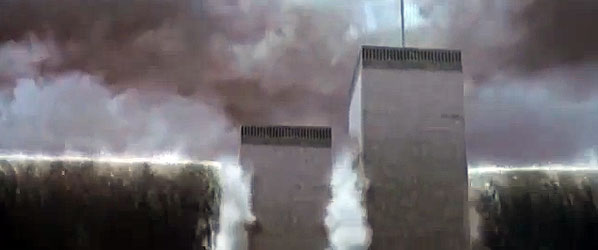

Arpad Lukacs
Arpad is a Film Studies graduate and passionate photographer (he picked up the camera and started taking stills just as he began his studies of moving pictures). He admires directors that can tell a story first of all in images. More or less inevitably, Brian De Palma has become Aprad’s favourite filmmaker.
Then there’s Arpad’s interest in anime. He was just a boy when he saw Nausicaä of the Valley of the Wind on an old VHS and was hypnotised by the story of friendship, devotion and sacrifice. He still marvels at the uncompromising and courageous storytelling in Japanese anime, and wonders about the western audience with its ever growing appetite for “Japanemation”.
Have a look at Arpad's photography site, and you can follow him on Twitter @arpadlukacs.
© 2022 STATIC MASS EMPORIUM . All Rights Reserved. Powered by METATEMPUS | creative.timeless.personal. | DISCLAIMER, TERMS & CONDITIONS
HOME | ABOUT | CONTACT | TWITTER | GOOGLE+ | FACEBOOK | TUMBLR | YOUTUBE | RSS FEED
CINEMA REVIEWS | BLU-RAY & DVD | THE EMPORIUM | DOCUMENTARIES | WORLD CINEMA | CULT MOVIES | INDIAN CINEMA | EARLY CINEMA
MOVIE CLASSICS | DECONSTRUCTING CINEMA | SOUNDTRACKS | INTERVIEWS | THE DIRECTOR’S CHAIR | JAPANESE CINEMA





